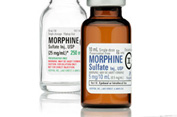Comparison of the analgesic effects of Post-operative Morphine, Pre-emptive and Post-operative Paracetamol in Septorhinoplasty Surgery
DOI:
https://doi.org/10.31661/gmj.v4i2.216Keywords:
Paracetamol, Septorhinoplasty, pre-emptive analgesia, analgesicsAbstract
Background: According to previous studies there are some different opinions on the pre-emptive effects of paracetamol in controlling post-operative pain, we aimed to compare the analgesic effects of pre-emptive paracetamol with post-operative paracetamol and morphine in patients undergoing septorhinoplasty. Materials and methods: A hundred and six patients aged 15 to 50 were divided into 3 groups. One received 1 g paracetamol 30 minutes before the operation, another group received 1 g paracetamol after the surgery and the control group received 3 mg morphine sulfate in the recovery room after the surgery. The pain severity was recorded for each patient using a 10 slot table. Any signs of nausea and vomiting (N/V) or apnea were closely observed and recorded. Patients with pain score 5 or more received 2 mg morphine intravascularly. Results: There was not any significant difference between the groups in total pain score and N/V (p>0.05). Post-operative morphine intake was significantly lower in pre-emptive group (P<0.05). None of the patients experienced apnea during the study. Conclusion: We concluded that pre-emptive paracetamol can lower the opium consumption in post-operative period but pre-emptive paracetamol cannot reduce the post-operative acute pain noticeably.
Published
2015-05-08
How to Cite
Taregh, S.-A.- hagh, Hadavi, M. R., Omidvari, S., & Daneshforouz, M. A. (2015). Comparison of the analgesic effects of Post-operative Morphine, Pre-emptive and Post-operative Paracetamol in Septorhinoplasty Surgery: . Galen Medical Journal, 4(2), e216. https://doi.org/10.31661/gmj.v4i2.216
Issue
Section
Short Communication







